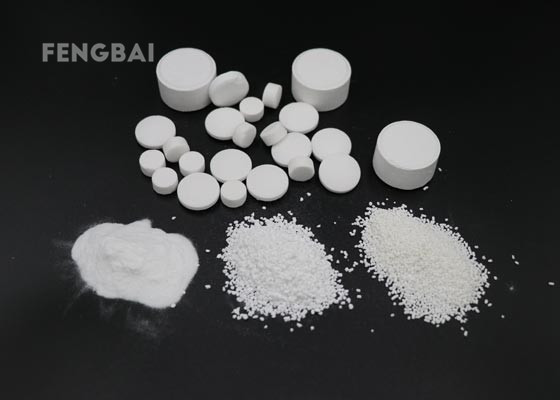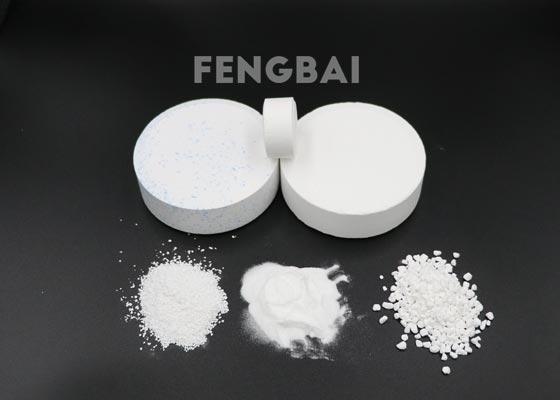

Chlorine disinfectants is one of the most commonly used disinfectant for water sterilization and disinfection, especially for pool water treatment. Chlorine disinfectants refer to the kind of disinfectant that dissolves in water to produce hypochlorous acid with microbicidal activity, and its microbicidal active ingredients are often expressed as available chlorine. Hypochlorous acid has a small molecular weight and is easy to diffuse to the surface of bacteria and penetrate the cell membrane into the bacteria body, oxidizing the bacteria protein and causing the bacteria to die.
Classification of Chlorine Disinfectants
1.Inorganic chlorine compounds. Sodium hypochlorite, calcium hypochlorite, trisodium chlorinated phosphate, etc.
2.Organic chlorine compounds. Sodium dichloroisocyanurate SDIC, trichloroisocyanuric acid TCCA, ammonium chloride, etc.
Inorganic chlorine is unstable in nature and is easily affected by light, heat and humidity, and loses its active ingredients. Organic chlorine is relatively stable, but it they are both unstable after being dissolved in water.
The Operational Principle of Chlorine Disinfectants
1.Oxidation of hypochlorous acid. Hypochlorous acid is a very small neutral molecule, which can diffuse to the surface of the negatively charged bacteria and penetrate into the bacteria through the cell wall to oxidize, destroy the phosphate dehydrogenase of the bacteria, destroy the phosphate dehydrogenase of the bacteria, and make the sugar metabolism unbalanced, so as to cause the death of bacteria.
2.Chlorination. Chlorine binds to cell membrane proteins to form nitrogen and chlorine compounds, which interferes with cell metabolism and finally causes the death of bacteria.
3.The role of new ecological oxygen. The decomposition of hypochlorous acid to form new ecological oxygen can oxidize bacterial proteins.
4.The higher the effective chlorine of chlorine disinfectant, the stronger the disinfection ability. The effective chlorine doesn’t refer to the chlorine content, but refers to the oxidizing power of the chlorine disinfectants. That is to say, the greater the oxidation capacity, the stronger the disinfection capacity.
Application Fields of Chlorine Chemicals
Generally, chlorine disinfectants are suitable for general object surfaces in medical and health institutions, public places and households(such as tables, chairs, bedside tables, sanitary ware, door and window handles, stair railings, bus seats, handles, toys and other surfaces) medical equipment, medical waste, as well as the disinfection of food and drinking utensils, fabrics, fruits and vegetables, water. Except hypochlorous water, other chlorine disinfectants are not suitable for disinfection of sir, hands, skin and mucous membranes. When using this kind of chemical, the specific use method should be carried out in accordance with the product instructions. According to the characteristics of the items to be disinfected, disinfection methods such as wine spraying, soaking, wiping and washing can be used.
Precautions for Use
1.When preparing and distributing concentrated disinfectant, you should wear masks and gloves. When using, please wear gloves to avoid skin contact. If splashed into the eyes accidentally, rinse with water immediately.
2.Keep in cool place away from light, moisture and sealed.
3.Chlorine chemicals have bleaching effect on fabrics and should not be used for disinfection of colored fabrics. It also has corrosion to metals and other objects, rinse in time after disinfection.
4.After disinfection of tableware and medical equipment, the residual disinfectant should be washed with water in time before being used on the human body.
5.Use in accordance with the scope of use, method of use, expiration date and safety test results marked in the specific product manual.
